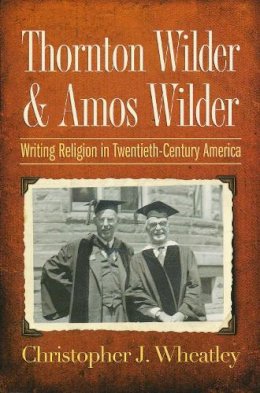10%OFF
Stock image for illustration purposes only - book cover, edition or condition may vary.
Thornton Wilder and Amos Wilder: Writing Religion in Twentieth-Century America
Christopher J. Wheatley
FREE Delivery in Ireland
Description for Thornton Wilder and Amos Wilder: Writing Religion in Twentieth-Century America
Paperback. Num Pages: 232 pages. BIC Classification: 1KBB; DSB; HRCG. Category: (P) Professional & Vocational. Dimension: 229 x 152 x 18. Weight in Grams: 367.
Thornton Wilder, the only author to have won the Pulitzer Prize for both drama and fiction, frequently portrays characters struggling with religious and theological issues. His work has been examined by critics in connection with American Puritanism, existentialism, and Vedantic literature, but little attention has been paid to the works of Thornton’s brother Amos, an ordained minister, poet, biblical scholar, literary critic, and professor at Harvard. Thornton Wilder and Amos Wilder: Writing Religion in Twentieth-Century America is the first book to explore the relationship between Thornton’s work and his brother Amos’s scholarship.
Previous critics of Thornton’s works have claimed ... Read morethat they describe timeless human values. Christopher Wheatley, on the contrary, argues that Wilder is primarily interested in the historical context of ideas, the ways in which they are a product of their time. He demonstrates how this parallels elements in Amos’s biblical scholarship. For the most part scholars have also treated Wilder’s works as if his ideas were static throughout his career. Wheatley contends that Wilder's early works of fiction and drama examine religion in times of historical crisis, whereas his later works demonstrate a deep concern about the intellectual, social, economic, and spiritual currents of contemporary America, as well as the influences of existentialism and postwar skepticism on his evolving religious ideas.
Drawing on extensive archival research in the papers of both brothers, Thornton Wilder and Amos Wilder: Writing Religion in Twentieth-Century America is essential reading for anyone interested in the Wilders, religion and literature, or American literature and drama.
Show Less
Product Details
Publisher
University of Notre Dame Press
Place of Publication
Notre Dame IN, United States
Shipping Time
Usually ships in 7 to 11 working days
About Christopher J. Wheatley
Christopher J. Wheatley is Ordinary Professor of English at the Catholic University of America.
Reviews for Thornton Wilder and Amos Wilder: Writing Religion in Twentieth-Century America
"Thornton Wilder and Amos Wilder is a thought-provoking study of Wilder's fiction and drama in relation to one of the great universal themes of human culture—religious belief. The unique thing about this study is that Christopher J. Wheatley reads Thornton Niven Wilder's literary works in relation to Amos Niven Wilder's both scholarly and poetic. The book is impressive for its ... Read morereading of both Wilders in the context of both pre-modern and modern literature that treats the religious theme, either skeptically or affirmatively." —Lincoln Konkle, The College of New Jersey “Christopher Wheatley offers a completely fresh way of seeing Thornton Wilder’s novels and plays and lays a solid foundation for a reinterpretation of Wilder’s work that pays serious attention to history.” —Nancy Bunge, Michigan State University "Christopher Wheatley has brought his considerable scholarly talents to bear in this excellent study of the extended 'dialogue' between brothers Thornton and Amos Wilder. Wheatley is particularly adept at illuminating the vexing issues of these men's times, especially those concerning religion. In many ways this book is a three-way discussion, as Wheatley engages the Wilders by brilliantly contextualizing and historicizing their modernist efforts and, in so doing, effectively demonstrating the contemporary relevance of the enduring tapestry that is Thornton's Amos-influenced oeuvre." —William W. Demastes, Louisiana State University "In Wheatley's sure hands critical biography and intellectual history combine to open up new intellectual vistas on Amos as an important religious thinker and Thornton as a seminal writer. The scholarship is rigorous and the results enlightening." —Mike Vanden Heuvel, University of Wisconsin–Madison "In this learned and expertly researched study, Christopher J. Wheatley draws knowledgeably upon a wealth of sources in religious thought, the Bible, Thornton and Amos Wilder's correspondence with one another and with others, and in the classics of world literature to provide detailed, incisive, and enlightening close readings of the full range of Thornton Wilder’s novels and plays. Wheatley also examines Wilder’s works and themes alongside the scholarly and critical writings of his brother––poet, biblical scholar, and literary critic Amos Wilder––and in the process not only greatly enhances our understanding of the religious ideas and philosophical motifs in Thornton Wilder’s works and the importance of the historical context in which they were written but also makes a very convincing case that the ongoing 'conversation' between the two siblings is essential to a full appreciation of Thornton Wilder’s works." —Jackson R. Bryer, co-editor, The Selected Letters of Thornton Wilder “Wheatley sets out to present a theological analysis of Thornton Wilder’s vast and varied output, and he supports his conclusions by citing the scholarly essays of Amos and the correspondence between them. As Wheatley argues, both followed parallel tracks through the religious landscape of the twentieth century, a journey marked by the horror of war and the Great Depression, which combined to challenge American optimism, and by the arrival of the historical-critical study of the Bible, which undermined the foundations of traditional American religious belief.” —America “This volume contends that the most immediate religious context for Thornton Wilder’s work was the scholarship of his brother Amos, and that both brothers saw themselves in a battle not against the modern age but against those who would consciously or not reduce faith to antiquarian interest.” —New Testament Abstracts Show Less

